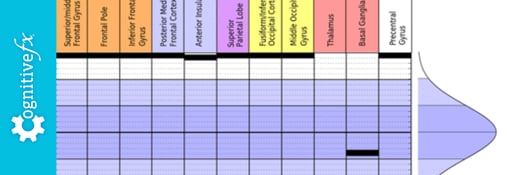Essential Fatty Acids & the Brain | Cognitive FX
Essential fatty acids seem to be a big fad right now. BCC Research states, “The global market for natural fatty acids sourced from vegetable oils, animal fats is projected to reach more than $25.7...
Published peer-reviewed research shows that Cognitive FX treatment leads to meaningful symptom reduction in post-concussion symptoms for 77% of study participants. Cognitive FX is the only PCS clinic with third-party validated treatment outcomes.
READ FULL STUDYThe Ketogenic diet was developed in 1921 to treat epileptic children. This diet was originally designed for 80 to 90 percent of calories to come from fat, 5 to15 percent to come from protein, and 5 to 10 percent to come from carbohydrates.
When you consume foods that contain lots of carbohydrates, the body converts those them into glucose, or blood sugar, which it then uses for energy. Because glucose is the simplest form of energy for the body, it’s used as a primary source for energy before your body uses stored fat for fuel.
On a ketogenic diet, the goal is to restrict the carbohydrate intake so that the body breaks down fat for energy. When this happens, fat is broken down in the liver, producing ketones, which is a by-product of the metabolism. These ketones are used to fuel the body in the place of glucose. The ketones produced from fatty acids are burned differently than glucose. This difference is beneficial to the brain because:
The ketogenic diet requires you to achieve a state of ketosis. To achieve and maintain ketosis, you have to severely reduce the number of carbs you eat. It is suggested the average American man over age 20 consumes about 47 percent of his daily calories from carbohydrates, and the average American woman over age 20 consumes about 50 percent of her daily calories from carbohydrates.
Initially, the weight loss comes from the loss of water, because you cut down on the carbohydrates in your diet and your body uses up the carbohydrates stored in the liver, which hold onto water. The diet results in further weight loss because it pushes you to load up on whole foods and satisfying healthy fats.
One study suggested the keto diet can increase fat loss in obese individuals when used for a couple of weeks and up to one year. A review of the ketogenic diet noted that one reason for weight loss is likely that the diet suppresses hunger due to the encouragement of consuming higher levels of healthy fats.
A study completed in 2012 found that children with epilepsy following a ketogenic diet had improved alertness and cognitive functioning when compared to traditional anti-epileptic pharmacotherapeutics. This study also discovered that the Ketogenic diet may also be beneficial for the treatment of other central nervous systems (CNS) disorders, like Alzheimer’s disease, Parkinson’s disease, and traumatic brain injury (TBI).
It has been proposed that further investigation into the ketogenic diet is needed to understand its potential benefits for traumatic brain injuries and its role with neuroprotection. Overall, this will help support the brain function and more efficiently use its energy.
There is more to the keto diet than weight loss. It has been shown to help Polycystic ovarian syndrome (PCOS) is an endocrine disorder that causes enlarged ovaries with cysts. A high-carb diet can negatively affect those with PCOS.
There aren't a lot of clinical studies on the ketogenic diet and PCOS. One study followed 5 women over a 24-week period found that the ketogenic diet increased weight loss and assisted in hormone balance. Research also suggests the diet could help people with type 2 diabetes and can lead to improvements in A1C levels (it can also lead to hypoglycemia if you take medication to lower your blood sugar).
It is common for individuals starting the diet to experience flu-like symptoms, like headaches and muscle aches. This side effect is SO common there’s a name for it: keto flu. To counter the keto flu it is recommended staying hydrated and keeping up with your electrolytes by using electrolyte tablets or Pedialyte. Other potential risks include kidney stones, vitamin and mineral deficiencies, and gastrointestinal distress. While some fats are healthy, there’s a risk in following a high-fat diet, you’ll increase your intake of unhealthy trans and saturated fats. These bad fats are found foods like red meat, poultry skin, cheese, and butter. They can lead to an increased risk of bad cholesterol and heart disease. A physician or dietitian should monitor your levels while on the keto diet to help prevent any negative effects from changing your diet.
If you are looking for the benefits of a keto diet, remember that the diet most likely requires a complete overhaul of the way you normally eat and a lot of dedication. But, it may be worth it if you’re looking to improve the overall health of your brain. At Cognitive FX, we understand the importance of having a healthy brain and its significance on your everyday life.
Before starting any diet, it is strongly recommended you discuss any significant dietary changes with your physician or dietitian.

Essential fatty acids seem to be a big fad right now. BCC Research states, “The global market for natural fatty acids sourced from vegetable oils, animal fats is projected to reach more than $25.7...

The brain is the most important organ in the human body. It regulates the profuse amount of information that the body needs to regulate itself. This includes comprehending pain levels, regulating...

Did you know the scientific name for an Avocado is Persea Americana? The avocado is prized for its high nutrient value and is added to various dishes due to its flavor and texture. The avocado has...
.png?height=175&name=Differences%20Between%20Post-Concussion%20Syndrome%20PCS%20%26%20Chronic%20Trauma%20Encephalopathy%20(CTE).png)
A concussion is a traumatic brain injury (TBI) which is caused by the brain hitting the skull. This can happen in sports, car accidents, falling, or anything similar. A concussion can even be the...

Begin by thinking about these questions:

fMRI (functional Magnetic Resonance Imaging) is often a more sensitive method for detecting brain injury such as concussion than a standard MRI (Magnetic Resonance Imaging) brain scan. fNCI...
Published peer-reviewed research shows that Cognitive FX treatment leads to meaningful symptom reduction in post-concussion symptoms for 77% of study participants. Cognitive FX is the only PCS clinic with third-party validated treatment outcomes.
READ FULL STUDY